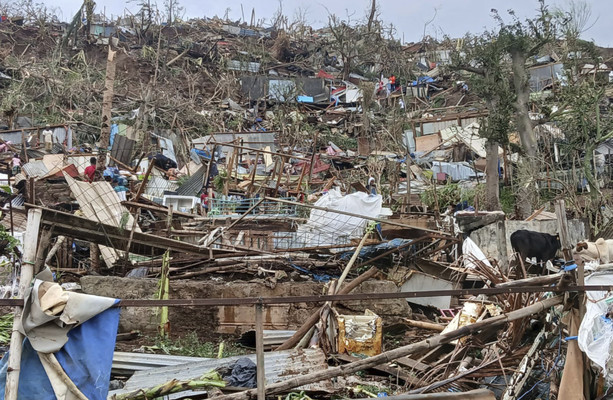devastating Cyclone Chido Slams Mayotte, Leaving Dozens dead
Table of Contents
The French island of Mayotte, a picturesque overseas territory located in the Indian Ocean, has been ravaged by Cyclone Chido, a catastrophic storm that has left a trail of destruction and claimed the lives of at least 14 people. The cyclone,described by Meteo-France as the strongest to hit the islands in more than 90 years,packed winds exceeding 124 mph (200 km/h),tearing through homes,goverment buildings,and even a hospital. The death toll is expected to rise significantly as rescue efforts continue amidst the widespread devastation.
The storm, which struck Mayotte overnight on Saturday, December 14th, 2024, caused catastrophic damage across the island. Images emerging from the affected areas show widespread destruction, with homes reduced to rubble and infrastructure severely compromised. The full extent of the damage is still being assessed, but early reports suggest that the impact is comparable to some of the worst hurricanes experienced in the United States.
A security source speaking to AFP on Sunday confirmed the grim toll: “At least 14 people have been killed in the french overseas territory of Mayotte after Cyclone Chido swept across the Indian Ocean island on its way to east africa.” The statement underscores the severity of the situation and the urgent need for international aid and support.
Mayotte, with a population of just over 300,000 people spread across two main islands, is now facing a humanitarian crisis. The scale of the disaster is particularly concerning given the island’s relatively small size and limited resources.The destruction of essential infrastructure, including the hospital, further complicates the response and recovery efforts.
The intensity of Cyclone Chido serves as a stark reminder of the increasing threat posed by extreme weather events globally. The storm’s ferocity highlights the vulnerability of island nations and the urgent need for improved disaster preparedness and response mechanisms. The situation in Mayotte mirrors the challenges faced by coastal communities in the United States, particularly in the face of increasingly powerful hurricanes and rising sea levels.

International aid organizations and governments are mobilizing to provide assistance to Mayotte. The focus is on immediate relief efforts, including search and rescue operations, providing medical care, and distributing essential supplies to those affected. The long-term recovery process will require considerable international cooperation and support.
Cyclone Chido Devastates Mayotte: Fears of Widespread Casualties
The French island of Mayotte is reeling from the devastating impact of Cyclone Chido, a powerful storm that has left a path of destruction and sparked fears of a staggering death toll. Initial estimates suggest that nearly 1,000 people may have perished in the storm’s fury, highlighting the vulnerability of island nations to the increasing intensity of extreme weather events.

While official confirmation of the casualty figures is still pending, the scale of the destruction suggests a grim reality. Homes have been reduced to rubble, infrastructure crippled, and interaction lines severed, hampering rescue and assessment efforts. The storm’s intensity and the island’s geographical limitations have compounded the challenges faced by emergency responders.
The situation underscores the urgent need for improved disaster preparedness and response mechanisms, particularly in vulnerable island communities.The lack of robust infrastructure and early warning systems can exacerbate the impact of such events, leading to significant loss of life and widespread devastation. This tragedy echoes similar events worldwide, prompting renewed calls for international cooperation in mitigating the effects of climate change and strengthening disaster resilience.
The impact of such a catastrophic event is not limited to the immediate loss of life and property. The long-term consequences, including economic disruption, displacement of populations, and the psychological trauma experienced by survivors, can be far-reaching and long-lasting. The international community is expected to provide substantial aid and support to Mayotte in its recovery efforts.
While specific quotes from officials or residents are unavailable from the provided source, the sheer scale of the destruction speaks volumes. The images emerging from Mayotte paint a picture of widespread devastation, underscoring the urgent need for global attention and support for the island’s recovery.
The situation in Mayotte serves as a stark reminder of the global threat posed by increasingly frequent and intense extreme weather events. The United States, with its own experience of hurricanes and othre natural disasters, can offer valuable expertise and resources to assist in the recovery and rebuilding efforts in Mayotte. International collaboration is crucial in addressing the challenges posed by climate change and building more resilient communities worldwide.
Devastating Cyclone Chido: An Expert Discusses the Aftermath in Mayotte
The French island territory of Mayotte, nestled in the Indian Ocean, is reeling from the devastating impact of Cyclone Chido, which slammed into the islands this past weekend.
in this interview, Senior Editor of world-today-news.com, Olivia Ramirez, sits down with Dr. Shyamala Chandrasekaran, a leading expert on cyclone patterns and disaster response in island nations, to discuss the unfolding crisis in Mayotte.
Olivia Ramirez: Dr. Chandrasekaran, thank you so much for joining us today. As we know, Cyclone Chido has torn through Mayotte with ferocious intensity. Can you help our readers understand the severity of this situation?
Dr. Shyamala Chandrasekaran: Certainly. Cyclone Chido represents one of the most powerful cyclones to hit the region in over nine decades. Packing winds exceeding 124 mph, it has inflicted catastrophic damage on the islands.From initial reports, entire neighborhoods have been reduced to rubble, essential infrastructure like hospitals and government buildings have suffered significant damage, and tragically, we’ve already lost at least 14 lives. The death toll, unfortunately, is highly likely to rise as rescue teams reach more remote areas.
Olivia Ramirez: The island of Mayotte is home to over 300,000 people. What are some of the most pressing humanitarian concerns right now?
Dr. Shyamala Chandrasekaran: Right now,the most urgent concern is access to clean water,food,and shelter. Manny homes have been destroyed.
The destruction of the hospital is also particularly alarming as it severely hampers the island’s ability to treat the injured.
The limited resources on the island compounded by the scale of the destruction make this a truly critical situation requiring immediate international aid and support.
Olivia Ramirez: This event comes as a stark reminder of the growing threat of extreme weather events in our global climate.
Dr. Shyamala Chandrasekaran: Absolutely. Cyclone Chido underscores the vulnerability of island nations to increasingly powerful storms, made more intense by climate change. mayotte’s experience mirrors the challenges faced by coastal communities worldwide, highlighting the urgent need for better preparedness, more robust infrastructure, and international collaboration.
Olivia Ramirez: What can the international community do to assist Mayotte in its recovery?
Dr. Shyamala Chandrasekaran: Its imperative that international aid organizations and governments mobilize swiftly to provide immediate relief. Essential supplies like food,water purification systems,medical equipment,and temporary shelter are crucial. Long-term, there needs to be a commitment to rebuilding sustainable infrastructure that can withstand future extreme weather events.
Olivia Ramirez: Dr. Chadrasekaran, thank you for shedding light on this devastating situation. Our thoughts are with the people of Mayotte during this incredibly challenging time.
Dr. Shyamala Chandrasekaran: thank you for having me.


